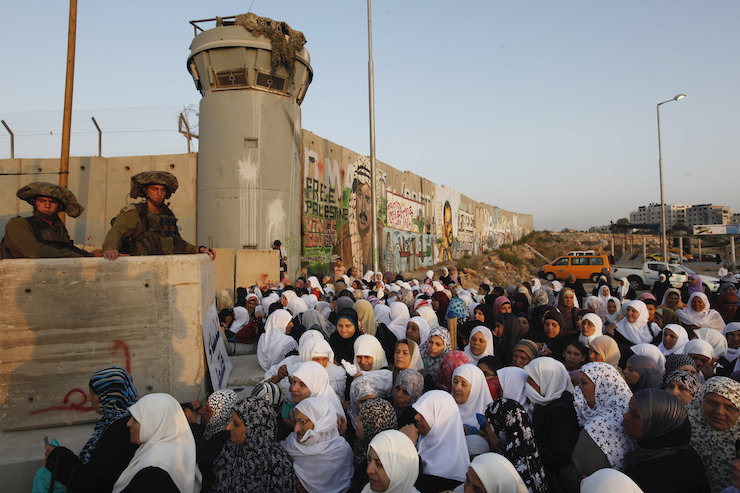Without a cartoon villain to rail against, the energy required to end the occupation is in danger of dissipating.
By Aron Keller

Given that Benjamin Netanyahu presided over the rightward shift of Israeli society and the hollowing out of its democratic institutions, the prospect of seeing his decade-long grip on the Prime Minister’s Office end should be a reason for liberals to celebrate. For the millions of Palestinians who have suffered as a direct result of his government’s policies, though, the end of the Netanyahu era could prove to be a mixed blessing.
‘Like Pepsi and Coke’ was how Palestinian Prime Minister Mohammad Shtayyeh described the differences between the main candidates. In other words, the lived reality of Palestinians in the West Bank, East Jerusalem and Gaza won’t change when Netanyahu is out of office; the system of violence and discrimination that deprives them of basic human rights is as robust as ever and it now contains the added threat of annexation of the Jordan Valley, as promised by both Netanyahu and his potential successor, Benny Gantz.
Yet by virtue of simply not being Netanyahu, and despite running a bellicose campaign focusing on his military credentials, Gantz is considered by many in the international community — including the editorial boards of The Guardian and the New York Times — to be a more palatable option. They assume that a Gantz-led government would be more open to peace negotiations, or at least to restoring liberal democratic norms within Israel. Others hope that a new Israeli prime minister might alleviate the tension between Israel and progressive Jews abroad, many of whom have been appalled by Netanyahu’s chauvinism and his close relationship to Donald Trump.
This misplaced optimism contributes to a culture of complacency, which could make Palestinian solidarity much more difficult. To be sure, Netanyahu is a symptom rather than the cause of Israel’s growing contempt for democracy; but through his unabashed racism and embrace of the global far-right, he has become a lightning-rod for anti-occupation activism. Without a cartoon villain to rail against, the energy required to end the occupation is in danger of dissipating. How can we maintain a sense of urgency around the issue?
These are some of the questions motivating the work of diaspora-based anti-occupation groups like Na’amod, of which I am a member. Na’amod is a movement of British Jews seeking to end their community’s support for the occupation, and to mobilize it in the struggle for freedom, equality and justice for all Palestinians and Israelis. As British Jews we are realistic about our limited capacity to effect change on the ground in Israel-Palestine. Our power lies in our ability to challenge support for the occupation within our own community, which plays an important role in sustaining the occupation as a whole.
Last week, on the morning after the Israeli elections, a group of Na’amod activists delivered a six-foot inflatable elephant to the offices of the Board of Deputies — the oldest and largest communal body representing British Jewry — calling on them to condemn the appalling racism and incitement against Palestinians seen during the campaign, along with the occupation itself. The action was part of Na’amod’s new campaign, “The Elephant in the Room,” which calls on the Jewish community to confront the moral crisis of the occupation whenever it talks about Israel, rather than ignoring or defending it.
The Board of Deputies regularly puts out statements that are uncritically supportive of Israel – from applauding the U.S. embassy move to Jerusalem to ascribing full responsibility to Hamas for the killings during the Gaza protests last year. Yet when it comes to condemning the racism, incitement and threats of annexation by the political leaders vying to form the next government, they are shamefully silent.
As Tamara Stanton, one of the Na’amod members who was at the action, said: “The occupation continues to be an elephant in the room of our community. Israel is part of our communal identity, yet the violence and discrimination of the occupation is rarely, if ever, acknowledged.”
Treating Netanyahu’s departure as a victory runs the risk of creating apathy for which a diverse movement engaged in collective action is the best antidote. As Jews, it is crucial we think seriously and strategically about how Jewish-Palestinian solidarity adjusts to a new political reality. By refusing to cooperate with communal institutions, organizations, events and programs that uphold or ignore the occupation, we will force our communal establishment to decide if it is on the side of freedom or perpetual injustice. In so doing, we will ensure that our communal values align with those of justice, equality, and dignity for everyone in Israel-Palestine, no matter who’s in charge.
Aron Keller lives in London where he is a member of Na’amod: British Jews Against Occupation.
